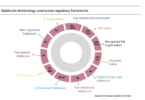Back in May, venture capital firm Andreessen Horowitz (a16z) held a ‘Crypto Regulatory Summit’ to deliberate over the proliferation of cryptocurrencies in the U.S. economy. The California-based firm is trying to address the regulatory uncertainty that surrounds cryptocurrency projects. Several officials from the Treasury Department and other regulatory agencies attended the event, according to a report by the Wall Street Journal.
The Securities and Exchange Commission considers most cryptocurrencies as securities. An example of the SEC’s outlook on digital assets is the recent lawsuit against Kik Interactive after it raised $100 million via an initial coin offering (ICO).
At the summit held by Andreessen Horowitz, co-founder Marc Andreessen discussed how blockchain and cryptocurrency could be modeled to build an online payments system instead of the legacy set-up. “Eighty percent of the things people hate about the internet today would not be problems,” Andreessen said.
In a recording made at the event, Andreessen compared cryptocurrencies to the early days of the internet, especially concerning security and regulations. As one of the founders of browser company Netscape, and head of its technology, Andreessen had a front row seat.
“It was not obvious that it would make sense to have these online businesses,” Andreessen said about the early internet. “It was not obvious that the use cases were going to have consumer demand. It was not obvious that you were going to be able to secure it. It was not obvious that there would ever be a business model behind it. All that actually had to get invented.”
Andreessen spoke about how the government tried to ban SSL, which makes web browsing secure. SSL was needed to use a web browser to send passwords and credit card numbers over the internet using encryption. Before SSL was widely adopted, there were numerous horror stories about credit card security.
Government regulations meant that secure SSL was not allowed to be exported. So for foreign users, browsers only supported weak encryption. Andreesen said that resulted in international browser competition with better encryption. Some of our team were active on the internet in those days, and we remember some not-too-serious competitors.
Foreign competition is an oft-mentioned rationale given to U.S. legislators not to enforce regulations too vigorously. Unquestionably, today there is significant competition for cryptocurrency companies outside of the U.S.
Andreesen went on to outline how hard it was to get connected to the internet in the early days. Again a parallel to how unfriendly cryptocurrencies are for consumers. Back in the mid-nineties internet software came on a floppy disk, and buying and connecting a modem was a non-trivial task.
The venture capitalist referred to the ‘original sin’ as not incorporating payments directly in the browser. The browser companies tried to align with credit card companies and banks, but couldn’t make it work. As a result, much of the internet today is driven by advertising.
“What if you had had the turbocharge of a real economic model based on money integrated into the thing [browser] from the very beginning?” pondered Andreessen. “What kinds of services would entrepreneurs have come up with that we haven’t thought of yet?”
In terms of parallels with the development of the internet, Andreessen reckons the current stage of cryptocurrency development is equivalent to 1992/3. “The usability gap still has a way to go, though it’s getting closer. Several big use cases exist. They have to be more productized,” he said. “It’s starting to feel really, really close to mainstream.” He also noted that in 1994, many people dismissed the internet.
Circling back to the regulation issue, Andreessen was asked whether he is optimistic about the U.S. for cryptocurrencies. He said that for the internet, the government had two opportunities to kill it and did the right thing.
“It’s good from a national security standpoint for the global financial system to be centered in the U.S. So I think there’s the opportunity here for enlightened policy that helps set the right guidelines and the right guardrails,” Andreessen concluded.
“Regulation itself is not the problem; it’s the lack of clarity around crypto regulation that our companies and the crypto space overall grapple with,” Kim Milosevich, a spokeswoman for Andreessen Horowitz told WSJ.
According to the WSJ article, the Washington attendees at the event were not that accommodating. Speakers from the Commodity Futures Trading Commission and the Treasury outlined the compliance they expect to see.
Meanwhile, the SECs stand on digital assets varies depending on who is speaking. Back in July, SEC Commissioner Hester Peirce claimed that by providing a safe harbor to digital assets, so they are not treated as securities, could benefit their growth. But this relaxed stance was a personal opinion. Peirce also added that the SEC will soon finish up writing its digital asset regulatory regime.
Andreessen Horowitz or A16z, has also decided to comply with SEC regulations, even though venture capital firms are free of securities regulations. Sidestepping the venture capital model, earlier this year it registered the entire firm and its team as financial advisors.
Last year Andreessen Horowitz set up a $300 million venture fund to invest in crypto companies and protocols. The portfolio includes Coinbase, DFINITY, MakerDAO, Filecoin and Libra.







